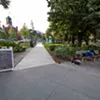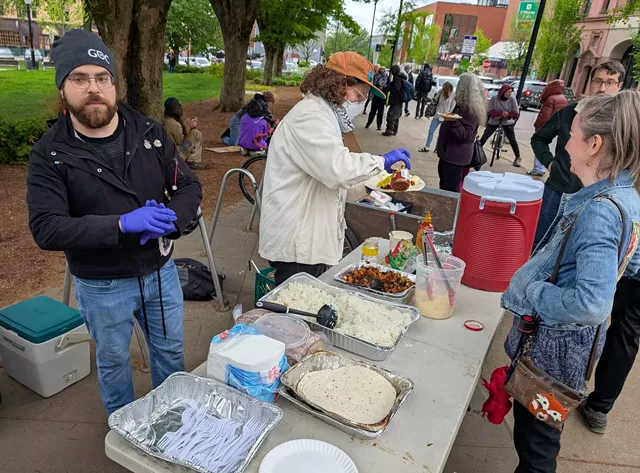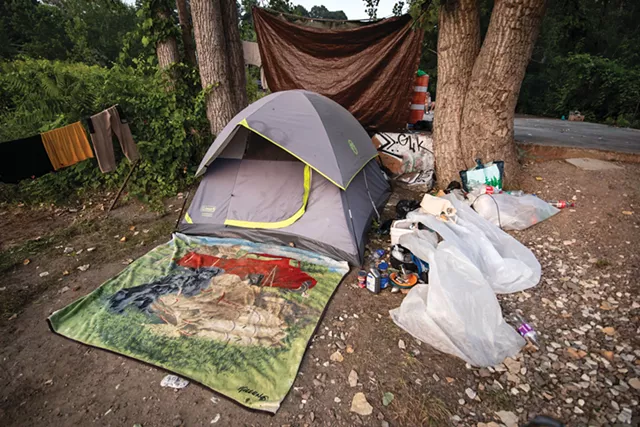Burlington city councilors on Monday passed a resolution that aims to crack down on illegal behavior, including overnight camping, in City Hall Park.
Led by council Democrats, the measure calls for a greater police presence in the park and for the city to “make all reasonable efforts” to ensure the park isn’t used after hours. It also encourages police to enforce city ordinances, such as those prohibiting open drug use.
The push is the council’s latest effort to restore order to a city whose tourist-friendly image has been tarnished by visible drug use and unsheltered homelessness. It was also a rare show of bipartisanship for a politically divided body that typically fails to find consensus on matters of public safety.
Council Dems Call for Crackdown at City Hall Park

Council Dems Call for Crackdown at City Hall Park
By Derek Brouwer
News
The measure passed 9-2, with councilors Melo Grant (P-Central District) and Marek Broderick (P-Ward 8) voting “no.” Councilor Gene Bergman (P-Ward 2) was absent.
“We want to reset the expectations of what we expect in our public spaces,” Councilor Buddy Singh (D-South District) said. “This is what that resolution is doing.”
Still, it’s unclear how effectively the city will be able to carry out the council’s wishes. Police have increased downtown patrols in recent months, but the department remains short-staffed. Mayor Emma Mulvaney-Stanak will report back in about a month about any challenges in meeting the resolution and how she’ll overcome them, the measure says.
One of the lone green spaces downtown, City Hall Park regularly hosts concerts, artist markets and other events. But it has also attracted unwanted behavior. Drug dealing and using are common sights, even in the daytime; homeless people regularly sleep there overnight.
Two weeks ago, a group of juveniles allegedly beat a man in the alleyway between the park and the Church Street Marketplace. The man later died, though police haven’t said whether the midday assault was the cause. A week after that, a man was struck in the head, possibly by a rifle, during a skirmish on College Street near the park after bar close.
People who spoke during public forum at Monday’s meeting shared mixed opinions on the resolution. Business owners testified that sales are down and that their employees are scared to come and go from work. Others said that people who break city ordinances should be held accountable.
Those opposed to the measure compared it to President Donald Trump’s recent executive order that calls for involuntarily committing homeless people for drug and mental health treatment — a characterization refuted by Council President Ben Traverse (D-Ward 5), who sponsored the resolution. Opponents encouraged the council to focus on less punitive responses.
Jed Davis, owner of the Farmhouse restaurant group, encouraged councilors to work together. “We need you to come up with big and bold ideas, and this can only happen if you’re pulling in the same direction,” he said.
That’s largely what happened during the council’s debate.
Councilor Carter Neubieser (P-Ward 1) joined council Democrats in calling for more accountability for people who commit serious offenses. He said passing the resolution wouldn’t negate the more progressive strategies championed by Mulvaney-Stanak, one of which councilors formally adopted Monday night.
The program, called “City Circle,” will refer offenders who violate city ordinances, including lower-level crimes, to a restorative justice panel — and to court if they don’t participate in the process. The city also recently started the “Situation Table,” an initiative that convenes experts to connect people, particularly repeat offenders, with services.
Councilor Becca Brown McKnight (D-Ward 6) said Monday’s resolution calls for enforcing rules already on the books, some of which are displayed on a sign at the entrance to City Hall Park. “Right now, that sign reads as some sort of dark parody,” she said.
Despite the overall collegiality of the discussion, there were still moments of disagreement. In an impassioned speech, Councilor Broderick said he fears homeless people will be punished for sleeping in the park when they have nowhere else to go. He criticized the resolution for not demanding that the state build more homeless shelters and invest in mental health care. It does, however, ask state leaders to convene panels to address youth violence, low-level drug dealing and barriers to addiction treatment.
Councilor Grant, the other “no” vote, said the resolution would take away police officers’ discretion when dealing with problematic behaviors in the park.
Interim Police Chief Shawn Burke spoke in support of the plan but cautioned that there’s no quick solution. He also highlighted a new strategy to dispatch social workers to calls involving people who are suicidal, experiencing a mental health crisis or having a suspected overdose. That would free up uniformed officers for other calls.
After the meeting, Traverse acknowledged that the police department may not have the personnel to patrol the park more often.
“That may be the reason, but it’s not the excuse,” he said. “If that is the case, we need to do more.”
That could include offering overtime shifts to Burlington officers or contracting with Vermont State Police for additional patrols, the resolution says.
Also on Monday, councilors unanimously ratified a new contract with the police union. The agreement with the Burlington Police Officers’ Association gives officers a 15 percent raise over three years and boosts starting pay to about $80,400 — a $9,400 increase from the previous contract.
The agreement also recognizes officers’ workload, guaranteeing those who work 15 consecutive hours at least nine hours off before their next shift. It also created a new program to allow officers to donate up to 120 hours of vacation or sick time per year to their colleagues. Other benefits include a more flexible bereavement leave policy and higher compensation for both field training officers and detectives working on call.
Mulvaney-Stanak said the competitive wages and benefits will ideally attract applicants from other departments, who, as certified officers, wouldn’t have to first attend the lengthy state police academy before reporting for duty.
Police union president Joe Corrow said the contract shows Burlington officers that they’re valued.
“Your support of this agreement reflects a shared commitment to public safety, to stability, to the future of this city,” he said. “We look forward to continuing to serve Burlington with the professionalism and dedication this community deserves.”


